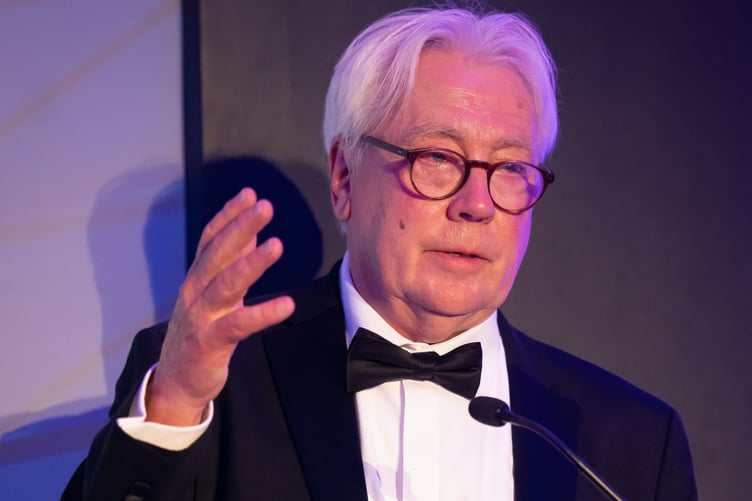“I can’t imagine anything worse than spending decades locked up in a tiny cell and knowing all the time you're innocent but hardly anyone believes you. Think of the anger and despair you’d feel and the corrosive effect it would have on your spirit,” explained Glyn Maddocks when asked what compels him to fight tirelessly for the long list of victims of miscarriages of justice he has represented.
He advised the Chronicle to, “Think back to the playground and that terrible sense of being wronged when you are blamed for something you didn’t do, and the teachers refuse to believe your protestations of innocence. Well, magnify that feeling of injustice by a million and you still won’t get close to the terrible rage and despair an innocent person feels when they’re left to rot in prison.
“It’s off the scale and not only destroys your life but it casts a long and terrible shadow over everyone involved. Couples split up, children grow up without a parent, people are forced to leave their homes, and an innocent person begins to lose all hope. And why? Because the criminal justice system got it wrong”
Righting those wrongs, which according to Glyn, happen a lot more than most people would like to believe, is something he has made his life’s mission following a chance encounter with a man named Tony Stock in 1993.
Glyn told the Chronicle, “Tony was my first miscarriage of justice case and it happened completely by chance. I was working for Gabb and Co in Crickhowell at the time and a carpet fitter from Llandrindod Wells named Tony came by the office. He said he had met a former client of mine in the pub who had said too ‘Try Glyn’ if he ever needed a solicitor.
“I listened to Tony’s story and although it was different from the cases I had usually covered I was intrigued and took it on.”
Glyn had qualified as a solicitor in 1986 and before the Tony Stocks case, he had already been involved in a number of high-profile cases. He had represented one of the non-fatal victims of the 1966 Aberfan disaster who was seeking damages against British Coal, and he had also represented the mother of private detective Daniel Morgan who was murdered in South London and whose killer has never been identified.
His work in personal injury and clinical negligence cases had already been recognised as extensive but it was the Stock case that first triggered his involvement and interest with victims of miscarriages.
On January 24, 1970, in Leeds City Centre, four men with iron bars entered a Tesco store and brutally attacked supermarket staff before making off with £4,000 in takings.
That same night, Tony Stock was sitting 70 miles away in Stockton-on-Tees celebrating his 31st birthday with family.
However, an identikit given by one of the victims to the police was wrongly identified as Tony Stock by an officer who had previously worked on a case involving Stock. Two years previously, Stock had been acquitted of a robbery in Bradford.
To compound matters, a witness also identified Stock when visiting his home with an investigating officer. Despite continued denials that he was guilty, Stock was given ten years for armed robbery.

In his book ‘The First Miscarriage of Justice,’ author Jon Robbins writes that Stock told him, "The first reaction after the verdict was just being numb. I was numb.
"I was taken from the court to the prison and locked up in the cell and my first feeling was 'ok, well it's been a terrible mistake but surely someone will find out. Someone will realise, you know...'.
"When they used to lock me up at night, everything would be quiet and the prison would come down checking the cells rattling the key, I would think 'Christ, this is it, they've realised. They've come to let me out.
"But they never came, obviously."
Despite rooftop protests and a 100-day prison hunger strike, Stock’s pleas of innocence fell on deaf ears.
The years ticked by, and he was left to languish in jail. His wife divorced him and when he was eventually freed after six years he moved to Llandrindod Wells, remarried, had children, and tried to bury the past and move on.
Except he couldn’t! The wrongful imprisonment that had stolen so much of his life still haunted him.
And then in 1979, police supergrass Samuel Benefield confessed to his part in the Leeds job when he was a member of a group called the Thursday Gang.
Consisting of robbers from London, the The Thursday Gang targeted a series of shops in the north of England and the Midlands during the late 60s and early 70s.
Benefield swore blind that Stock had never been involved in the Leeds robbery or any of the others.
Nevertheless, the testimony of the supergrass wasn’t enough for Home Secretary Willie Whitelaw, and Stock was refused a pardon.
Years later Stock would enlist the help of Glyn Maddocks to clear his name. In 1996 when the case reached the Court of Appeal, and Benefield appeared in disguise to give evidence that Stock was an innocent man, the court refused to listen and his conviction remained.
It was a devastating blow for the solicitor and his client.
Glyn recalled, “Despite accepting evidence that Mr Benefield had given against former members of the gang, they refused to believe him when it came to Tony. People in the court were gobsmacked at the judge’s decision because it seemed so illogical and perverse.”
Glyn and his client resigned themselves to fight on. The case was sent back to the Court of Appeal in 2004 and again in 2008, but on both occasions, Stock’s conviction was upheld.
Stock died in 2012 without managing to clear his name.
Glyn explained, “Tony was obsessed with clearing his name to the point it destroyed his life. It’s the same for a lot of people who suffer miscarriages of justice. He died without managing to win the fight that mattered to him most.”
Although he was unsuccessful in helping to clear Stock’s name, Glyn counts the case of Oliver Campbell, whose conviction for murder was finally quashed by the Court of Appeal in September 2024 as a huge victory.
Often called one of the longest miscarriages of justice in British criminal history, Campbell was a shy and softly spoken man with severe learning difficulties and an IQ of 73. In 1991 he was found guilty of the shooting and murder of London shopkeeper Baldev Hoondle.
Campbell’s conviction was secured during a series of intensive police interviews, many of which took place without a lawyer present.
Glyn told the Chronicle, “There is a lot of stigma surrounding false confessions. Many people ask, ‘Why would you ever confess to doing something terrible, if you were innocent?’ Well, there’s a host of academic discussion about the nature of confessions in police custody. For a start, in that environment people sometimes do not fully realise the extent of what they are confessing to and other times they just want he endless interrogation to end. Particularly if that person is a vulnerable 19-year-old black person with learning difficulties.”
Despite no DNA evidence linking him to the crime, Campbell was given a life sentence.
Nearly 34 years later, Campbell’s conviction for murder and conspiracy to rob was quashed. At the age of 54 and after serving 11 years in prison he said he could finally start life as “an innocent man.”
New expert evidence suggested that Campbell’s confessions to the police had been false on the basis that he scored “abnormally high” for acquiescence, with an “extreme tendency to just, when in doubt, say yes”.
Despite the tired stereotype of lawyers as ruthless money-grabbing sharks who care little for the truth, let alone justice, Glyn not only dedicates a large part of his life fighting on behalf of victims of miscarriages of justice but he also does it Pro Bono.
Although there’s a preconceived notion that individuals who successfully overturn criminal convictions are entitled to significant financial compensation for the years stolen from them and the stain on their character, this is no longer the case.
Glyn explained that following a change in law in 2014, an overturned conviction is no longer enough to secure financial redress.
“Oliver wasn’t eligible for compensation because in 2014, the government stopped compensation for anyone who couldn’t prove beyond a reasonable doubt that they didn’t do it,” said Glyn.
And even if they do receive financial compensation to help build a new life for themselves outside of prison, they may have the “bed and board” costs whilst in prison deducted from their final payout.
Such was the case in another one of Glyn’s high-profile clients - Paul Blackburn. Whose eventual acquittal led to Glyn being honoured with the Welsh Lawyer of the Year award in 2005.
After 25 years spent in prison for a crime he was wrongly accused of as a teenager, Blackburn was finally released in 2003.
When he was just 15 Blackburn was jailed for life in 1978 for the attempted murder and sexual assault of a nine-year-old boy in Warrington, Cheshire.
The victim was fishing by a canal when he was forced by a teenager with a knife into an abandoned sewage works.
He was sexually assaulted, beaten, and stabbed before being placed under a wooden board weighed down with bricks. He was thankfully found 28 hours later and survived.
Blackburn became the chief suspect namely because he was a troubled kid from a violent background and had previous convictions for burglary and arson.
His conviction rested solely on a confession he wrote after being interrogated by detectives for hours on end with no lawyer present.
Blackburn told The Guardian in 2009 that he finally broke down and told them stuff he knew they wanted to hear. "It was real good cop, bad cop stuff. All very obvious, but when you're a kid it's terrifying.”
Blackburn explained that detectives effectively dictated the statement and lied in court that the confession was freely offered.
In 2005 the appeal court decided the police “did not tell the truth” and his conviction was quashed.
Yet the damage had been done.
Blackburn explained, “The day I walked into prison I became something different. You're not even a normal prisoner. I'm in prison for the attempted murder and sexual assault of a young child. I'm a nonce. You're a beast and an animal, and you're treated as such."
Glyn told the Chronicle, “Paul has been damaged for the rest of his life by his experiences. He had his own childhood taken away and had to grow up fast inside. He had to really fight just to survive and some of the stuff he told me you don’t want to know. No amount of compensation can make up for that, but unlike Tony, he did manage to finally clear his name.”
However, when Blackburn received compensation in 2011 he still had to pay more than £100,000 of it back for the privlege having a roof over his head and food on the table during his incarceration.
In an ideal world, miscarriages of justice wouldn’t happen, but they do, and even one, is far too many.
Not only is an innocent person locked up but the guilty party walks free.
Glyn explained, “We have too much of an adversarial system in this country and the establishment often has a habit of closing ranks. They cannot be seen to be anything but infallible, but people make mistakes, policemen make mistakes, and courts make mistakes.
“General incompetence, false confessions, wrongful identification, malpractice, and faulty forensic evidence can all conspire to create a deadly trap for an innocent individual,” explained Glyn, who added, “A crucial factor is that the public perception of the foolproof nature of forensic science is wrong. A recent parliamentary report warned that the forensic science sector is in a ‘graveyard spiral’ and wrongful convictions are on the rise. Forensic investigations are all carried out in-house by the police now who in many cases just haven’t got the adequate training and knowledge to do the job right.”
Glyn believes that as a society we should and could do more when it comes to miscarriages of justice and said, “When a plane crashes, a team of investigators study the black box to discover what happened and prevent history from repeating itself. Yet it seems in the criminal justice system, there is a sense of complete denial and we’re doomed to repeat the same mistakes over and over again.”






Comments
This article has no comments yet. Be the first to leave a comment.